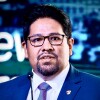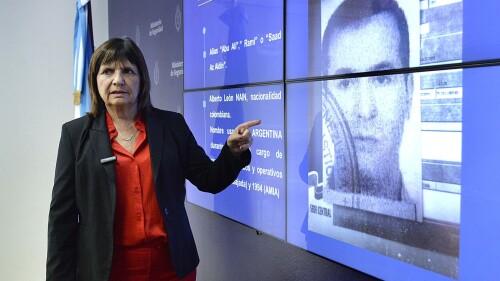Argentina’s President Mauricio Macri is preparing to officially designate Hezbollah as a foreign terrorist organization, the first designation of its kind in Latin America. |
This week we honor the 85 victims of the largest Islamist terrorist attack in Latin America’s history: the bombing the Asociación Mutual Isrealita Argentina (AMIA) on July 18, 1994. Twenty-five years have passed since the morning when a Renault van packed with 300 kilograms of explosives detonated in front of the AMIA building in Buenos Aires, Argentina. It took more than a decade — until 2006 — for the Argentine government to formally charge the Islamic Republic of Iran and its terror-proxy, Hezbollah, for carrying out the attack. Now, 13 years after that, Argentine President Mauricio Macri is taking a historic step and preparing to officially designate Hezbollah as a foreign terrorist organization in Argentina, the first designation of its kind in Latin America.
The significance of this executive action in Argentina cannot be understated. President Macri and his national security team have done what was once seen as politically impossible in Latin America -- to designate Hezbollah as a terrorist organization -- and make it politically possible.
Designating Hezbollah was once seen as politically impossible in Latin America. |
The designation is just one of a series of actions that the Macri administration has been quietly working on during the past six months to add new tools to combat the convergence of international terrorism with transnational organized crime. This project includes a national registry, known as the Registro Nacional de Personas y Organizaciones Sospechosas de Terrorismo or RENAPOST in its Spanish acronym, of individuals and organizations suspected of having ties to terrorism. Apart from this registry, a joint declaration is expected to be announced: the relaunch of the Tripartite Command of the Tri-Border Area, previously known as the 3+1 Group, between Argentina, Brazil, Paraguay, and the United States (the "+1").
U.S. Secretary of State Mike Pompeo will be in Buenos Aires this week for the historic announcement at the second Western Hemisphere ministerial conference on counterterrorism, which sets the stage for greater counterterrorism cooperation in Latin America. The conference also serves as an opportunity for President Macri to formalize the US-Argentine Dialogue on Illicit Finance, led by Mariano Federici, president of Argentina’s Financial Intelligence Unit who, along with Argentine Minister of Security Patricia Bullrich, were instrumental in causing these executive actions to happen.
For too long, Latin America has taken a backseat to the rest of the world in counterterrorism cooperation.
Both Sunni and Shi’a extremist groups are on the rise in Central and South America. |
Clearly, the region has not been as affected as others by the global wave of radical Islam; nonetheless, both Sunni and Shi’a extremist groups are on the rise in Central and South America, as well as the Caribbean. Just recently, four men with suspected ties to ISIS, possibly en route to the U.S. southwest border, were arrested by the Nicaraguan government. If you ask any counterterrorism official in Latin America, however, it is Hezbollah that has developed the most sophisticated crime-terror network, active in just about every country south of the Rio Grande.
Hezbollah’s External Security Organization (ESO), or Unit 910 as it is known within the counterterrorism community, is the senior varsity team of international terrorism. In recent years, ESO operatives were caught preparing attacks in Azerbaijan, Cyprus, Egypt, Thailand, and, in 2012, successfully bombed a bus in Bulgaria, on July 18th, the same date, of the AMIA attack. Bulgaria may seem far away from Latin America, but the same Hezbollah terror network also plotted attacks in Peru and Bolivia in 2014 and again in 2015. Some of the same ESO operatives in these recent plots are, in fact, connected to the 1994 AMIA attack in Argentina.
Salman Raouf Salman |
The Colombian-born, Lebanese dual national, Salman Raouf Salman, otherwise known as Samuel Salman El Reda El Reda is considered a key high-ranking Hezbollah ESO operative, currently living in the Dahieh suburb of Beirut, Lebanon. Salman was the on-the-ground Hezbollah operative who prepared the operational aspects of the AMIA attack.
More recently, Peruvian authorities suspect that Salman was the handler of accused Hezbollah ESO operative Mohamad Ghaleb Hamdar, arrested in Lima, Peru in October 2014 for allegedly plotting a terrorist act. According to Peruvian counterterrorism officials, Hamdar possibly communicated with Salman Raouf Salman through two Hezbollah facilitators, José Mario Saladini alias “Hussein Ali” and Ali Abbas Chahine, who traveled in and out of Peru from 2008 to 2013, via Chile and Bolivia.
Mohamad Ghaleb Hamdar |
Hamdar is currently on trial in the Peruvian Supreme Court, but Hezbollah’s terror network in Peru dates back to the era of the AMIA attack.
In September 1992, six months after the bombing of the Israeli embassy in Buenos Aires, an alleged Hezbollah operative, Nidal Bazoun, crossed from Bolivia to Puno, Peru, where he married a local nurse and remained in the country until two months after the AMIA attack. In September 1994, Peruvian immigration officials detained Bazoun in Piura (near the Peru-Ecuador border), the same city which Iranian businessman and Halal inspector, Hossein Parsa, traveled to on July 4, 1994, just weeks before the AMIA attack. Parsa directed the Government Trading Corporation (GTC), the same Iranian front company that was established in Argentina by the Iranian “mastermind” of the AMIA attack, Mohsen Rabbani. Parsa returned to Argentina from Peru, on July 17, 1994, the day before the bombing of the AMIA in Buenos Aires.
This short historical anecdote reveals that the long arm of Iran and Hezbollah’s terror network was long-active throughout South America, even prior to the AMIA attack.
The late Special Prosecutor of the AMIA case, Alberto Nisman, disclosed this fact in 2013, when he released a 500-page dictum documenting evidence that the same Iran-Hezbollah terror network that carried out the AMIA attack was active in no fewer than eight countries throughout South America -- and extending to the Caribbean, where a foiled terrorist plot was hatched against the JFK airport in New York City that might have rivaled the atrocities of September 11, 2001.
Thankfully, U.S. intelligence and law enforcement foiled the JFK plot, but this intercession emphasizes the importance of President Macri’s efforts to designate Hezbollah and other Islamist terrorist groups. Argentina’s designation of Hezbollah helps clear up any confusion as to who and what Hezbollah is in a region not familiar with the intricacies of Islamist terrorism. For some in Latin America, Hezbollah is seen as a counterfeiter; for others, they appear more as money-launderers and drug traffickers, and there are still others who consider Hezbollah simply a Lebanese political party and social movement.
President Macri is leading Latin America in the global fight against Islamist terrorism. |
Hezbollah may be all of the above, but this does not take away from the fact that Lebanon’s “Party of God” is first and foremost the primary terrorist proxy of the Islamic Republic of Iran.
By calling and legally designating them for what they are -- a foreign terrorist group -- Argentine officials can now begin to anticipate Hezbollah’s actions by communicating with more than 57 nations worldwide in the same counterterrorism language.
The purpose of anti-terrorism is to anticipate terrorist actions in order to neutralize them. It is hopeless to wait until an attack takes place and then take action. By designating Hezbollah as a foreign terrorist organization, President Macri is leading Latin America in the global fight against Islamist terrorism -- and in doing so, honoring the memory of the 85 Argentines who died in the 1994 AMIA attack.
Joseph M. Humire is the executive director of the Center for a Secure Free Society (SFS) and a fellow at the Middle East Forum.










